人教版九年级全册Unit 13 We're trying to save the earth!语法课件(共60张PPT)
文档属性
| 名称 | 人教版九年级全册Unit 13 We're trying to save the earth!语法课件(共60张PPT) | 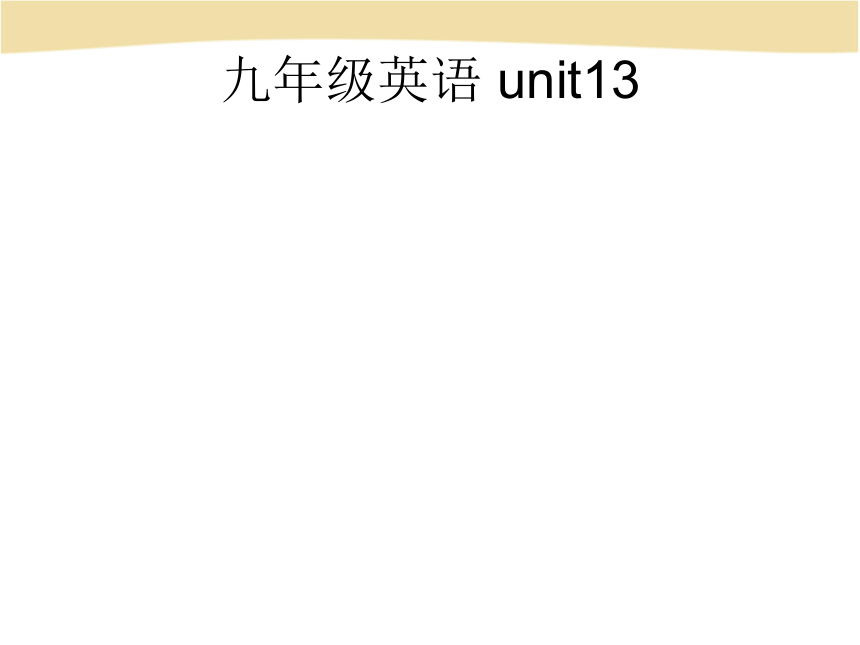 | |
| 格式 | zip | ||
| 文件大小 | 1.0MB | ||
| 资源类型 | 教案 | ||
| 版本资源 | 人教新目标(Go for it)版 | ||
| 科目 | 英语 | ||
| 更新时间 | 2022-12-07 16:17:32 | ||
图片预览

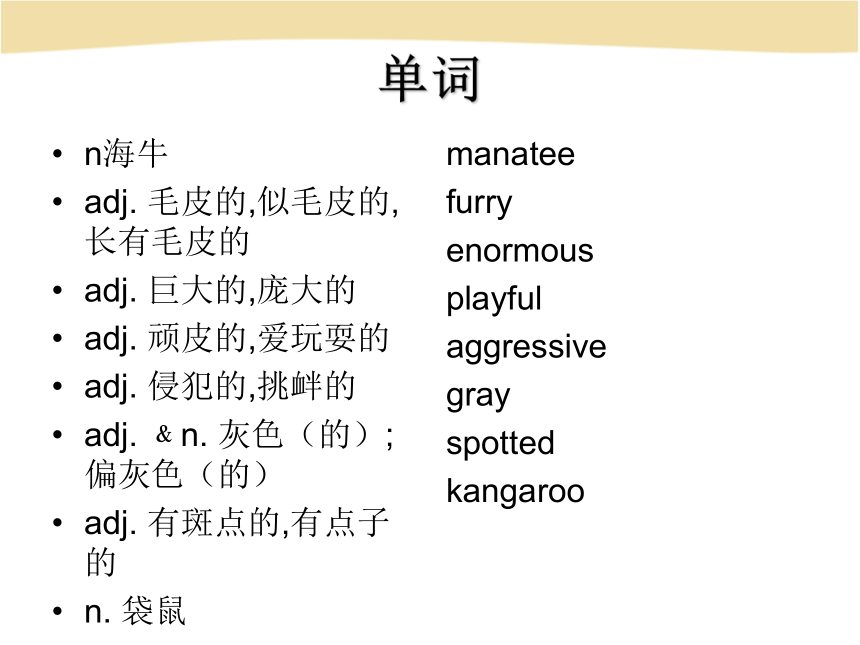
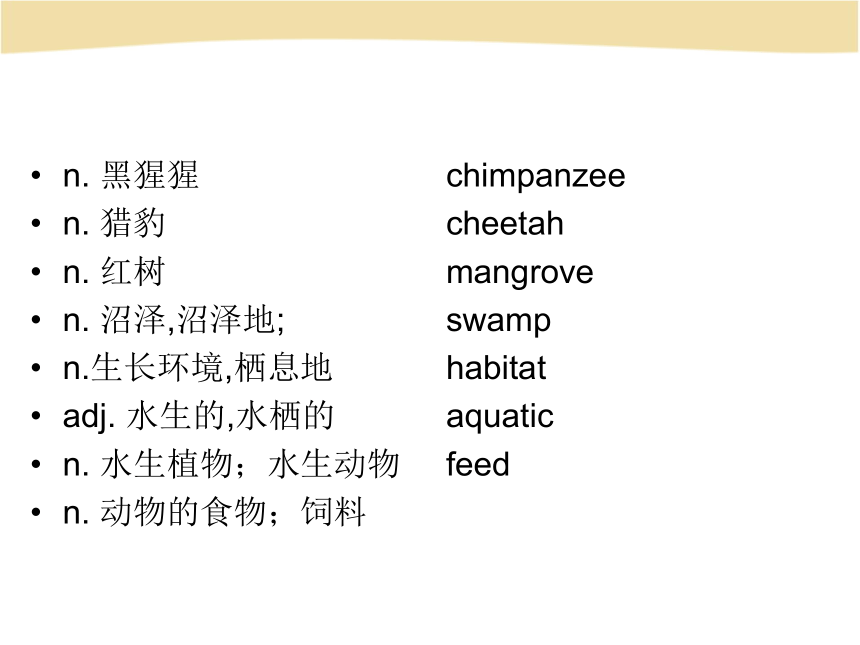
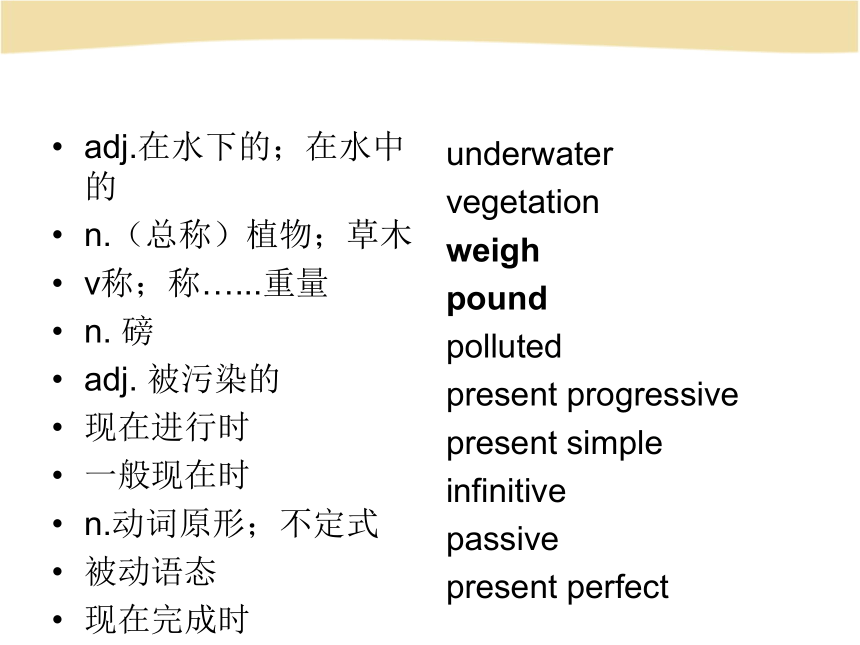
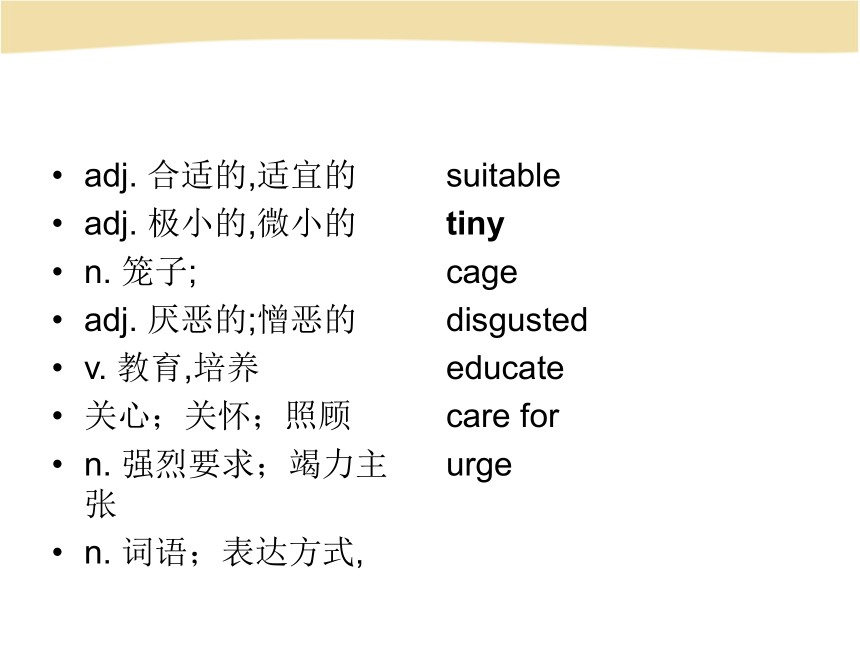
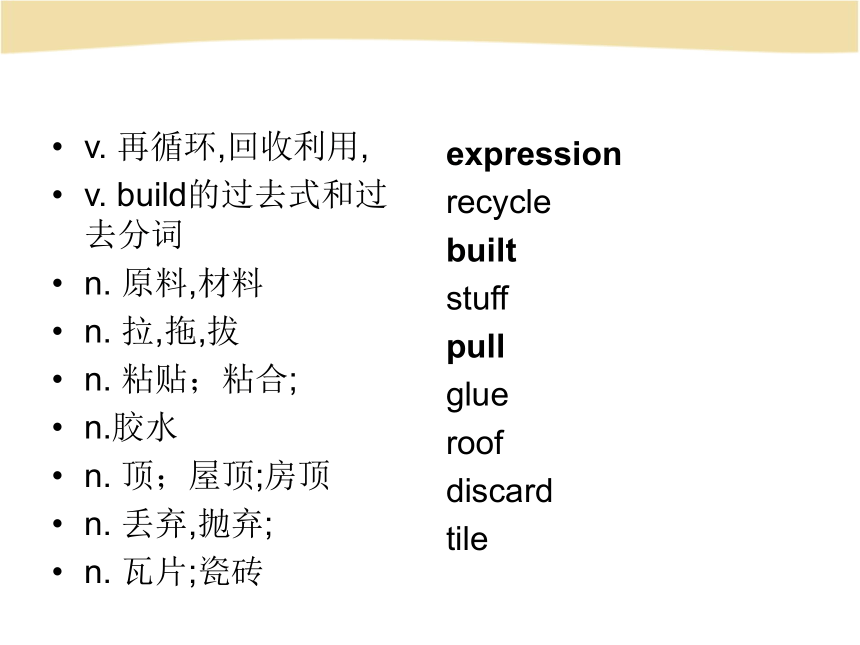
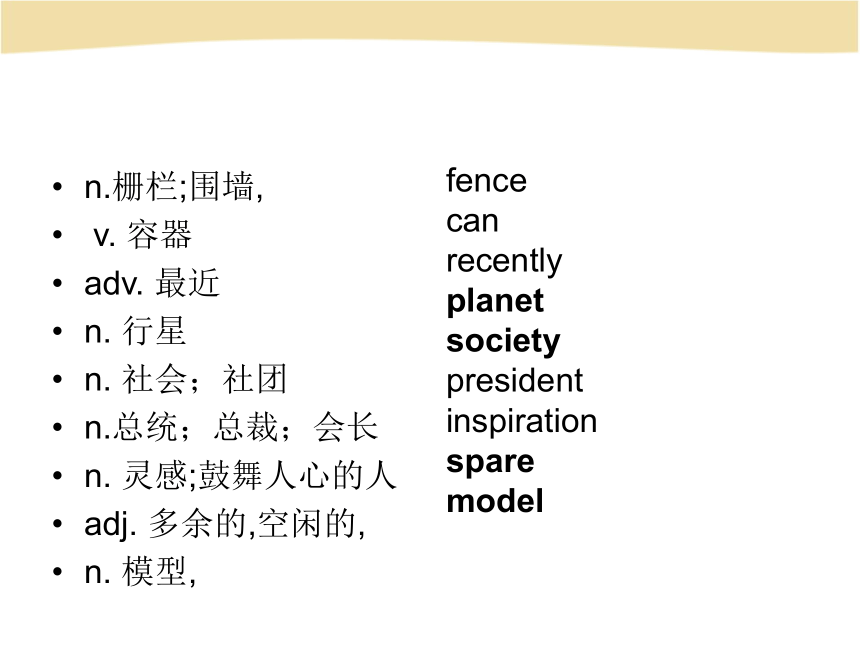
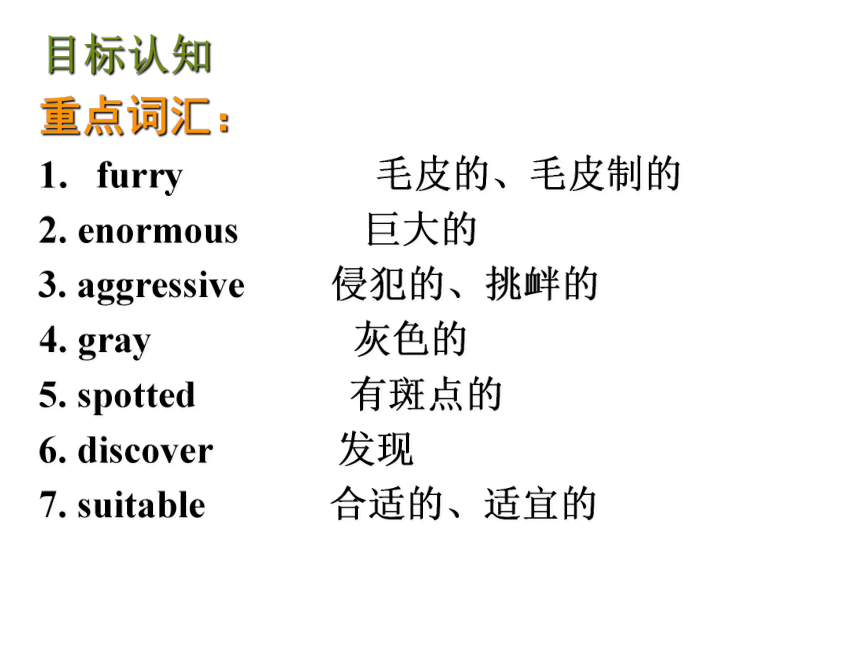
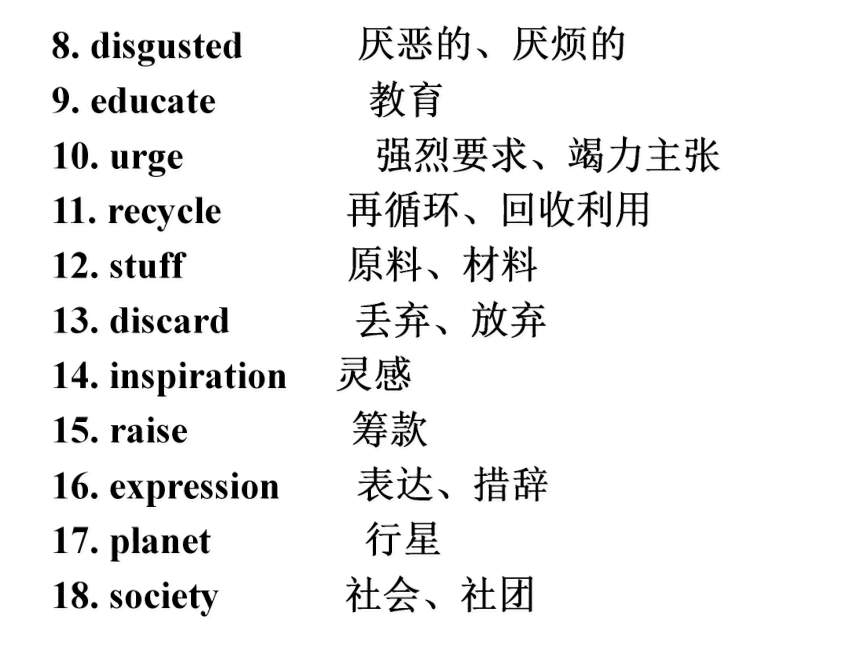
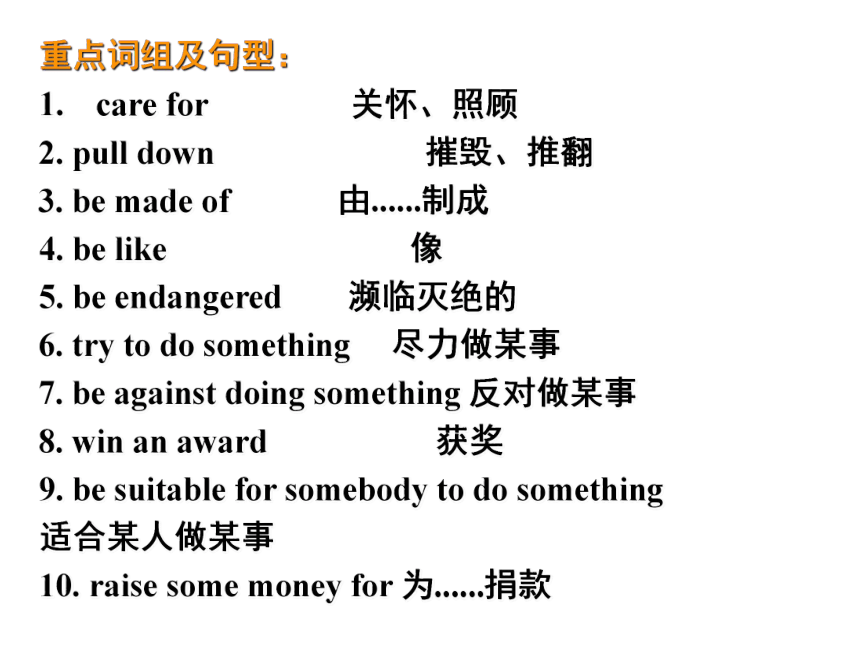
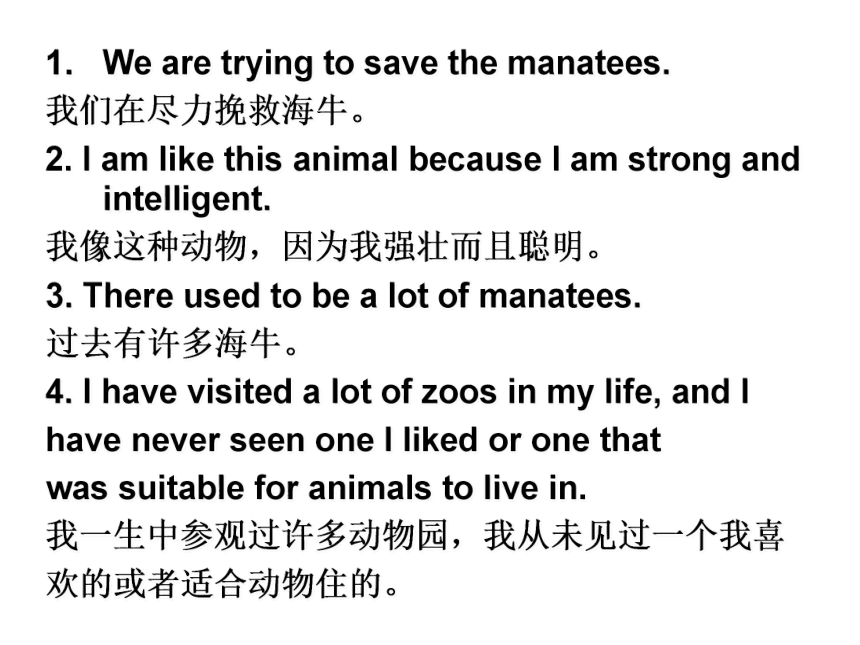
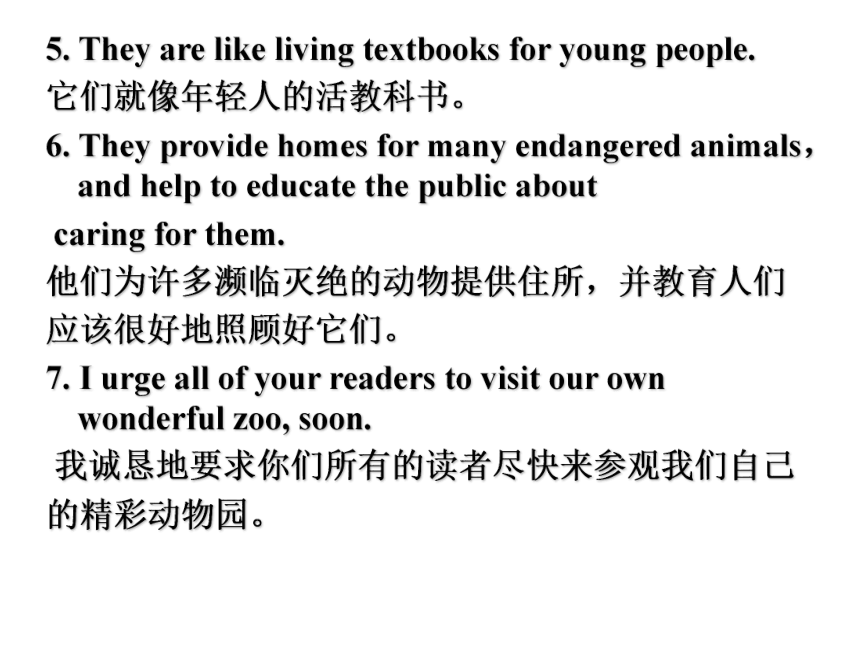
文档简介
(共60张PPT)
九年级英语 unit13
单词
n海牛
adj. 毛皮的,似毛皮的,长有毛皮的
adj. 巨大的,庞大的
adj. 顽皮的,爱玩耍的
adj. 侵犯的,挑衅的
adj. ﹠n. 灰色(的);偏灰色(的)
adj. 有斑点的,有点子的
n. 袋鼠
manatee
furry
enormous
playful
aggressive
gray
spotted
kangaroo
n. 黑猩猩
n. 猎豹
n. 红树
n. 沼泽,沼泽地;
n.生长环境,栖息地
adj. 水生的,水栖的
n. 水生植物;水生动物
n. 动物的食物;饲料
chimpanzee
cheetah
mangrove
swamp
habitat
aquatic
feed
adj.在水下的;在水中的
n.(总称)植物;草木
v称;称…...重量
n. 磅
adj. 被污染的
现在进行时
一般现在时
n.动词原形;不定式
被动语态
现在完成时
underwater
vegetation
weigh
pound
polluted
present progressive
present simple
infinitive
passive
present perfect
adj. 合适的,适宜的
adj. 极小的,微小的
n. 笼子;
adj. 厌恶的;憎恶的
v. 教育,培养
关心;关怀;照顾
n. 强烈要求;竭力主张
n. 词语;表达方式,
suitable
tiny
cage
disgusted
educate
care for
urge
v. 再循环,回收利用,
v. build的过去式和过去分词
n. 原料,材料
n. 拉,拖,拔
n. 粘贴;粘合;
n.胶水
n. 顶;屋顶;房顶
n. 丢弃,抛弃;
n. 瓦片;瓷砖
expression
recycle
built
stuff
pull
glue
roof
discard
tile
n.栅栏;围墙,
v. 容器
adv. 最近
n. 行星
n. 社会;社团
n.总统;总裁;会长
n. 灵感;鼓舞人心的人
adj. 多余的,空闲的,
n. 模型,
fence
can
recently
planet
society
president
inspiration
spare
model
目标认知
重点词汇:
furry 毛皮的、毛皮制的
2. enormous 巨大的
3. aggressive 侵犯的、挑衅的
4. gray 灰色的
5. spotted 有斑点的
6. discover 发现
7. suitable 合适的、适宜的
8. disgusted 厌恶的、厌烦的
9. educate 教育
10. urge 强烈要求、竭力主张
11. recycle 再循环、回收利用
12. stuff 原料、材料
13. discard 丢弃、放弃
14. inspiration 灵感
15. raise 筹款
16. expression 表达、措辞
17. planet 行星
18. society 社会、社团
重点词组及句型:
care for 关怀、照顾
2. pull down 摧毁、推翻
3. be made of 由......制成
4. be like 像
5. be endangered 濒临灭绝的
6. try to do something 尽力做某事
7. be against doing something 反对做某事
8. win an award 获奖
9. be suitable for somebody to do something
适合某人做某事
10. raise some money for 为......捐款
We are trying to save the manatees.
我们在尽力挽救海牛。
2. I am like this animal because I am strong and intelligent.
我像这种动物,因为我强壮而且聪明。
3. There used to be a lot of manatees.
过去有许多海牛。
4. I have visited a lot of zoos in my life, and I
have never seen one I liked or one that
was suitable for animals to live in.
我一生中参观过许多动物园,我从未见过一个我喜
欢的或者适合动物住的。
5. They are like living textbooks for young people.
它们就像年轻人的活教科书。
6. They provide homes for many endangered animals,and help to educate the public about
caring for them.
他们为许多濒临灭绝的动物提供住所,并教育人们
应该很好地照顾好它们。
7. I urge all of your readers to visit our own wonderful zoo, soon.
我诚恳地要求你们所有的读者尽快来参观我们自己
的精彩动物园。
8. She lives in a house that she built herself out of trash.
她住在一个她自己用垃圾建造的房子里。
9. The walls are made from old glass bottles that are glued together.
墙是用粘在一起的旧玻璃瓶做成的。
10. Amy is an inspiration to us all.
Amy是我们所有人的精神鼓舞。
日常用语:
We are trying to save the manatees.
我们在尽力挽救海牛。
2. I am like this animal because I am strong
and intelligent.
我像这种动物,因为我强壮而且聪明。
3. There used to be a lot of manatees.
过去有许多海牛。
精讲巧练
1. We are trying to save the manatees. 我们在尽力挽救海牛。
(1.)本句的时态是现在进行时,表示现阶段正在做的事情。现在进行时所表示的动作并不一定在说话的时刻进行,而是在包括说话时刻在内的一段时间当中进行。
例如:My mother is writing a novel now.
我妈妈目前在写小说。
(2.)动词短语try to do something的意思是“尽力做某事”,实际做与不做视情况而定;try doing something表示“试着做某事”,即动作真的进行了或者正在进行。
例如:He tried to read more, but it was too dark to read.
他想要多看会书,但是天太黑了以至于不能看了。
They tried to solve the problem.
他们尽力解决这问题。
He tried pulling the door, and opened it at once.
他试着拉了拉门,门一下子就开了。
随时练
【考例】They were trying ______ the child but they failed at last.
save B. to save
C. saved D. saves
【答案与解析】答案是B。动词try的后面用动词不定式表示“尽力做某事”的意思。从句子的意思“他们在尽力挽救那个男孩,但最后失败了”可以判断是用动词不定式。
2. I am like this animal because I am strong and intelligent. 我像这种动物,因为我强壮而且聪明。
(1.)句子的like是介词,它的意思是“像”,它和一些连系动词be,look和seem等连用构成动词短语 表示“长得像、看起来像、似乎好像”的意思。
例如:It looks like my cat.
它看起来像我的猫。
(2.)like的前面可以用very, much,rather,quite等修饰表示“很像、非常像、相当像、十分 像”的意思。
例如:You look very much like your father.
你看上去非常像你的爸爸。
随时练
【考例】The boy _____ his mother, not only tall but also thin.
likes B. like
C. look like D. looks like
【答案与解析】答案是D。本句子的like是介词,和连系动词look连用表示“长得像”的意思,主语是第三人称单数形式,所以连系动词用looks。
3. There used to be a lot of manatees. 过去有许多海牛。
句型there used to be是there be的中间加动词短语used to表示“过去曾经有而现在没有”的意思。There be的中间可以加will表示将来有;加情态动词may/can/must表示“可能有、一定有”的意思。
例如:There used to be a tall building in front of our school.
在我们的学校前面曾经有一座大楼。
随时练
【考例】There ______ be an English party tomorrow. Would you like to go with me
can B. may
C used to D. will
【答案与解析】答案是D。本句子的时间状语是tomorrow表示一般将来时,所以用will表示“将来有”的意思。
4. I am writing to say that I am against building a new zoo in our town. 我写信是想说我反对在我们镇建公园。
(1)against是介词,此句中意思是“反对”,反义词是for(赞成),后面如果接动词时要用动名词形式(动词ing形式)。
No one is against this proposal.
没有人反对这个提议。
We are all against inviting such a person to the party.
我们都反对邀请这样一个人参加晚会。
(2)against 还有“倚着、靠着、逆着”等意思。
We sailed against the wind.
我们逆风行船。
He placed the ladder against the wall.
他把梯子靠在墙上。
随时练
【考例】He agreed to most of the plan, but ________ starting it now.
A. for B. was for
C. against D. was against
【答案与解析】答案是D。选项D意思是“反对”,against是介词,作谓语时必须加be。选项B意思是“赞成”,不合句意。句意:他对这个计划的大部分内容都赞成,但是反对现在开始实施。
5. I have visited a lot of zoos in my life, and I have never seen one I liked or one that was suitable for animals to live in. 我一生中参观过许多动物园,我从未见过一个我喜欢的或者适合动物住的。
(1.)连词and引导的是并列句,第一个句子是现在完成时I have visited a lot of zoos in my life;第二个句子中的动词seen后面用两个宾语one。第一个one有定语从句I liked 修饰,第二个one有that引导的定语从句修饰。
(2.)动词短语be suitable for somebody to do的意思是“适合某人做某事”,句子后面的to live in中的in不能省略,因为前面的one是此介词的宾语。
This toy is not suitable for young children to play with.
这个玩具不适合小小孩玩。
(3.)in one’s life 一生,一辈子
Lei Feng did lots of good deeds in his life.
雷锋一生中做了许多好事。
随时练
【考例】There is not enough space for everyone _______.
A. to stand on B. to stand
C. standing on D. standing
【答案与解析】答案是A。本句子是考查动词不定式的用法,for everyone to stand on中的介词on不能省略,因为它带有逻辑宾语,即前面的名词space,去掉on就成了stand a place,应该是stand on a place。
6. They are like living textbooks for young people. 它们就像年轻人的活教科书。
(1.)句子的living是现在分词作形容词用,它的意思是“活着的、使用中的”。
例如:She has no living relatives.
她没有活着的亲人了。
(2.)living还可以作名词用,它的意思是“生计”。
例如:She earns a living as a writer.
她靠写作维持生计。
随时练
【考例】They want to buy some ______ fish to offer the guests.
A. living B. lived
C. died D. dying
【答案与解析】答案是A。本句子是用形容词living修饰后面的名词fish表示“活着的鱼”,从句子的意思可以判断是用living。
7. They provide homes for many endangered animals,and help to educate the public about caring for them. 他们为许多濒临灭绝的动物提供住所,并教育人们应该很好地照顾好它们。
(1.)动词provide的意思是“提供、供应”,它可以构成动词短语provide something for somebody和provide somebody with something。
例如:They provide some drinking water for us.
他们为我们提供一些饮用水。
They provide us with some useful information.
他们为我们提供一些有用的信息。
(2.)动词短语care for的意思是“喜欢、在意、照顾”。
例如:I don’t really care for red wine.
我其实并不喜欢红葡萄酒。
Who can care for me when I am old?
我老了谁来照顾我?
随时练
【考例】Can you provide us _____ some useful books
for B. with C. of D. on
【答案与解析】答案是B。本句子是考查动词短语provide with的用法,provide somebody with something是“向某人提供某物”的意思。
8. I urge all of your readers to visit our own wonderful zoo, soon.. 我诚恳地要求你们所有的读者尽快来参观我们自己的精彩动物园
(1.)动词urge的意思是“强烈要求、竭力主张”,它可以构成动词短语urge somebody to do something。
例如:The boy urges his father to buy a new bike for him.
这个男孩强烈要求他爸爸给他买一辆新自行车。
(2.)urge+宾语+adv./ prep.表示“强烈要求某人、某物怎么样”的意思。
例如:He urged the horse on with a whip.
他用鞭子策马前行。
随时练
【考例】All of my students _____ me not to give them too much homework.
urge B. urges
C. to urge D. urging
【答案与解析】答案是A。本句子的主语是students,所以谓语动词用urge表示“强烈要求某人做某事”的意思。
9. She lives in a house that she built herself out of trash. 她住在一个她自己用垃圾建造的房子里。
(1.)a house that she built herself out of trash是定语从句,that是引导词,在定语从句中作宾语,house是先行词。
例如:He was the man that fell into the river yesterday.
他就是那个昨天落入河中的人。
(2.)herself是反身代词,用在名词或者代词的后面表示强调。
例如:I saw it myself.
我自己亲眼看到的。
随时练
【考例】Do you know the man _____ is speaking with your father?
which B. what
C. who D. where
【答案与解析】答案是C。本句子是考查引导定语从句的关系代词的用法,本句子的先行词man是表示人,所以用关系代词who引导定语从句并在定语从句中作主语。
10. But it‘s hard to stop riding in cars. 但是不坐汽车很难。
(1)stop doing sth. 是“停止做某事”,而stop to do sth. 则是“停下来去做某事”。
例如:We must never stop studying English.
我们要不停地学习英语。
He stopped to talk with me.
他停下来和我谈话。
(2)ride in a car/train/plane 乘汽车/火车/飞机
They rode in the back seat of the bus.
他们坐在公共汽车后面的座位上。
随时练
【考例】At last, Lucy make the baby ____ and the baby began to smile.
A. stop crying B. to stop crying
C. stop to say D. to stop to cry
【答案与解析】答案是A。考查动词make和stop的用法,make sb. do sth. make后要接动词原形做宾语补足语,所以接stop;“停止做某事”是stop doing sth.,所以用stop crying表示“不再哭了”。
11. I agree with you. 我同意你的看法。
(1)agree是“同意,取得一致的意见”的意思。agree后常跟不定式或that从句,并经常与介词to, with,on等连用。反义词是disagree,经常用disagree with sb. 意思是“不同意某人的意见或想法”。
① agree with 表示同意某人或某人的意见、想法、分析、解释等。后接表示人的名词或代词时,一般只用 agree with。
I don’t agree with you.
我不同意你的意见。
They agreed with this idea.
他们同意这个想法。
I agree with what you say.
我同意你说的。
② agree to 主要用来表示一方提出一项建议、安排、计划等,另一方同意协作。
We agreed to their arrangement.
我们同意了他们的安排。
Do you think he will agree to (=accept) my suggestion
你认为他会同意 (接受)我的建议吗
agree to do sth. 同意做某事
He agreed to go with us.
他同意同我们去。
③ agree on 主要指双方通过协商而取得一致意见或达成协议:
We agreed on the price.
我们就价格达成了一致意见。
随时练
【考例】I'm afraid that I could not agree _______ you.
on B. with
C. to D. in
【答案与解析】答案是B。考查动词agree的用法,后接表示人的名词或代词时,一般只用 agree with。
12.You have probably never heard of Amy Winterbourne before. 你可能从未听说过艾米 温特博恩。
hear of 意思是“听说”,而hear from 意思是“得到……消息”。
例如:Most of the children have heard of Snow White.
大多数孩子都听说过白雪公主。
Do you often hear from your brother
你常接到你兄弟的来信吗?
对比:
(1)hear 接从句,是“听说”的意思。
I hear that one of the pandas has a baby.
我听说其中一只熊猫生了个熊猫宝宝。
(2)hear sb/sth 听到某人或某物的声音。
I can’t hear you at all.
我根本就听不到你的声音。
Haven’t you heard anything
难道你没有听到什么声音? ◎
(3)hear sb do sth 听到某人做某事。
I often hear Li Ping read English in the morning.
我经常在早晨听到李平读英语。 ◎
(4)hear sb doing sth 听到某人正在做某事。
I heard him singing in the next room.
我听见他正在隔壁房间里唱歌。
随时练
【考例】---Do you know about Amy Winterbourne
---No.I have never _______ him before.
heard B. heard of
C. heard from D. heard that
【答案与解析】答案是B。考查动词hear的用法,hear sb. 听见某人的声音;hear of 听说;hear from 收到某人的信。
13. The walls are made from old glass bottles that are glued together. 墙是用粘在一起的旧玻璃瓶做成的。
(1.)句子的动词短语be made from的意思是“由......做成或制成的”,一般看不出来原料,但是如果原材料是可以看出来的,需用介词of表示。
例如:Paper is made from wood and grass.
纸是由木材和草做成的。
The wine is made from rice.
这酒是由稻谷制成的。
The bridge is made of stone.
这桥是石头砌的。
(2.)be made out of的意思是“由......做成的”。
例如:The house are made out of used cans.
这个房子是由用过的饮料瓶做成的。
The dress was made out of that material.
这件连衣裙是用那块料子做的。
随时练
【考例】Look! Your desk is made _____ wood.
of B. from C. to D. by
【答案与解析】答案是A。本句子是考查动词短语be made of的用法,它表示“某物是由......做成的”意思。用介词of表示原材料是可以看出来。
各种时态和语态的用法
一、一般现在时
一般现在时表示现在习惯性的动作或者存在的状态,也可以表示经常发生的动作或者存在的状态。它的基本结构是“主语+动词原形+句子的其他成分”,当句子的主语是第三人称单数的时候,谓语动词一般加-s或者-es。
例如:They want to buy a new house.
他们想买一所新房子。
The earth moves around the sun.
地球围着太阳转。
一般现在时的否定句是在动词的前面加助动词don’t或者doesn’t;一般疑问句是在句子的前面用助动词Do或者Does。
例如:Do you speak English
你说英语吗?
Does your mother buy that bike
你妈妈买那辆自行车了吗?
They don’t like apples.
他们不喜欢苹果。
My brother doesn’t like eating vegetables.
我的弟弟不喜欢吃蔬菜。
二、现在进行时
现在进行时表示说话人说话的时候正在发生或者进行的动作。它的基本结构是“主语+be +doing +其他成分”。
例如:The boy is reading a story-book.
那个男孩正在看故事书。
My mother is watching TV.
我的妈妈正在看电视。
现在进行时的一般疑问句是把be提到句子的前面,并且首字母要大写。
例如:Are you reading English
你们正在读英语吗?
现在进行时的否定句是在be的后面加not。
例如:Your father isn’t reading newspaper.
你的爸爸没在看报纸。
三、现在完成时
现在完成时表示一个动作已经完成,但它所产生的结果对目前仍然有影响;也可以表示一个动作从过去发生,但一直持续到现在。它的基本结构是“主语+have(has) +动词的过去分词 +其他成分”。
例如:We have already finished our homework.
我们已经完成了我们的家庭作业。
现在完成时的一般疑问句是把助动词have(has)提到句子的前面,并且首字母要大写。
例如:Have you ever been to Beijing
你曾经去过北京吗?
现在完成时的否定句是在助动词have /has的后面加not。
例如:They have not finished their work so far.
到目前为止,他们还没有完成工作。
现在完成时的难点是非延续性动词如何转换为延续性动词。
例如:His father has died for two years.
(错误)
His father has been dead for two years.
(正确)他的爸爸已经死了两年了。
How long have you bought that bike
(错误)
How long have you had that bike
(正确)你买那辆自行车多长时间了?
四、 被动语态
被动语态是表示句子的主语不是后面动词所表示的动作的执行者,而是动作的承受者。它的基本结构是“主语+be+及物动词的过去分词+其他成分”。
例如:The blackboard is cleaned every day.
黑板每天被擦干净。
被动语态与时态综合考查,主要考查一般现在时、一般过去时、现在进行时、一般将来时和现在完成时的被动语态。它们的基本结构是:
被动语态的主要考查重点是短语动词的被动语态和含有情态动词的被动语态。
例如:My father is taken good care of by that nurse.
我爸爸有那位护士照顾。
All the test papers must be handed in after class.
所有的试卷课下必须都交上。
五、used to+动词原形的用法
used to+动词原形表示过去曾经发生的动作或者存在的状态,它强调过去的习惯和状态,暗示现在不再是这样,它只能用于一般过去时。它的否定句是用didn’t use to或者used not to。
例如:I didn’t use to get up early. 我过去不是常常起得很早。
它的一般疑问句是把used提到句子前面或者在句子前面加did,并且首字母要大写。
例如:Did you use to be late when you were a boy
在你是个小孩子的时候,是不是常常迟到?
中考要点是:used to和be used to +doing的区别。be used to + doing表示“习惯于做某事”的意思。
广东省中考题
-I didn’t hear you come in just now.
-That’s good.We tried any noise,for you were sleeping.
A.not make
B.not to make
C.to make
D.making
一般将来时
一般现在时
一般过去时
现在进行时
现在完成时
Will do
Will be +done
am is are +done
was were +done
am/is/are +being done
have/has+been+ done
have/has + done
am/is/are + doing
did
do / does
九年级英语 unit13
单词
n海牛
adj. 毛皮的,似毛皮的,长有毛皮的
adj. 巨大的,庞大的
adj. 顽皮的,爱玩耍的
adj. 侵犯的,挑衅的
adj. ﹠n. 灰色(的);偏灰色(的)
adj. 有斑点的,有点子的
n. 袋鼠
manatee
furry
enormous
playful
aggressive
gray
spotted
kangaroo
n. 黑猩猩
n. 猎豹
n. 红树
n. 沼泽,沼泽地;
n.生长环境,栖息地
adj. 水生的,水栖的
n. 水生植物;水生动物
n. 动物的食物;饲料
chimpanzee
cheetah
mangrove
swamp
habitat
aquatic
feed
adj.在水下的;在水中的
n.(总称)植物;草木
v称;称…...重量
n. 磅
adj. 被污染的
现在进行时
一般现在时
n.动词原形;不定式
被动语态
现在完成时
underwater
vegetation
weigh
pound
polluted
present progressive
present simple
infinitive
passive
present perfect
adj. 合适的,适宜的
adj. 极小的,微小的
n. 笼子;
adj. 厌恶的;憎恶的
v. 教育,培养
关心;关怀;照顾
n. 强烈要求;竭力主张
n. 词语;表达方式,
suitable
tiny
cage
disgusted
educate
care for
urge
v. 再循环,回收利用,
v. build的过去式和过去分词
n. 原料,材料
n. 拉,拖,拔
n. 粘贴;粘合;
n.胶水
n. 顶;屋顶;房顶
n. 丢弃,抛弃;
n. 瓦片;瓷砖
expression
recycle
built
stuff
pull
glue
roof
discard
tile
n.栅栏;围墙,
v. 容器
adv. 最近
n. 行星
n. 社会;社团
n.总统;总裁;会长
n. 灵感;鼓舞人心的人
adj. 多余的,空闲的,
n. 模型,
fence
can
recently
planet
society
president
inspiration
spare
model
目标认知
重点词汇:
furry 毛皮的、毛皮制的
2. enormous 巨大的
3. aggressive 侵犯的、挑衅的
4. gray 灰色的
5. spotted 有斑点的
6. discover 发现
7. suitable 合适的、适宜的
8. disgusted 厌恶的、厌烦的
9. educate 教育
10. urge 强烈要求、竭力主张
11. recycle 再循环、回收利用
12. stuff 原料、材料
13. discard 丢弃、放弃
14. inspiration 灵感
15. raise 筹款
16. expression 表达、措辞
17. planet 行星
18. society 社会、社团
重点词组及句型:
care for 关怀、照顾
2. pull down 摧毁、推翻
3. be made of 由......制成
4. be like 像
5. be endangered 濒临灭绝的
6. try to do something 尽力做某事
7. be against doing something 反对做某事
8. win an award 获奖
9. be suitable for somebody to do something
适合某人做某事
10. raise some money for 为......捐款
We are trying to save the manatees.
我们在尽力挽救海牛。
2. I am like this animal because I am strong and intelligent.
我像这种动物,因为我强壮而且聪明。
3. There used to be a lot of manatees.
过去有许多海牛。
4. I have visited a lot of zoos in my life, and I
have never seen one I liked or one that
was suitable for animals to live in.
我一生中参观过许多动物园,我从未见过一个我喜
欢的或者适合动物住的。
5. They are like living textbooks for young people.
它们就像年轻人的活教科书。
6. They provide homes for many endangered animals,and help to educate the public about
caring for them.
他们为许多濒临灭绝的动物提供住所,并教育人们
应该很好地照顾好它们。
7. I urge all of your readers to visit our own wonderful zoo, soon.
我诚恳地要求你们所有的读者尽快来参观我们自己
的精彩动物园。
8. She lives in a house that she built herself out of trash.
她住在一个她自己用垃圾建造的房子里。
9. The walls are made from old glass bottles that are glued together.
墙是用粘在一起的旧玻璃瓶做成的。
10. Amy is an inspiration to us all.
Amy是我们所有人的精神鼓舞。
日常用语:
We are trying to save the manatees.
我们在尽力挽救海牛。
2. I am like this animal because I am strong
and intelligent.
我像这种动物,因为我强壮而且聪明。
3. There used to be a lot of manatees.
过去有许多海牛。
精讲巧练
1. We are trying to save the manatees. 我们在尽力挽救海牛。
(1.)本句的时态是现在进行时,表示现阶段正在做的事情。现在进行时所表示的动作并不一定在说话的时刻进行,而是在包括说话时刻在内的一段时间当中进行。
例如:My mother is writing a novel now.
我妈妈目前在写小说。
(2.)动词短语try to do something的意思是“尽力做某事”,实际做与不做视情况而定;try doing something表示“试着做某事”,即动作真的进行了或者正在进行。
例如:He tried to read more, but it was too dark to read.
他想要多看会书,但是天太黑了以至于不能看了。
They tried to solve the problem.
他们尽力解决这问题。
He tried pulling the door, and opened it at once.
他试着拉了拉门,门一下子就开了。
随时练
【考例】They were trying ______ the child but they failed at last.
save B. to save
C. saved D. saves
【答案与解析】答案是B。动词try的后面用动词不定式表示“尽力做某事”的意思。从句子的意思“他们在尽力挽救那个男孩,但最后失败了”可以判断是用动词不定式。
2. I am like this animal because I am strong and intelligent. 我像这种动物,因为我强壮而且聪明。
(1.)句子的like是介词,它的意思是“像”,它和一些连系动词be,look和seem等连用构成动词短语 表示“长得像、看起来像、似乎好像”的意思。
例如:It looks like my cat.
它看起来像我的猫。
(2.)like的前面可以用very, much,rather,quite等修饰表示“很像、非常像、相当像、十分 像”的意思。
例如:You look very much like your father.
你看上去非常像你的爸爸。
随时练
【考例】The boy _____ his mother, not only tall but also thin.
likes B. like
C. look like D. looks like
【答案与解析】答案是D。本句子的like是介词,和连系动词look连用表示“长得像”的意思,主语是第三人称单数形式,所以连系动词用looks。
3. There used to be a lot of manatees. 过去有许多海牛。
句型there used to be是there be的中间加动词短语used to表示“过去曾经有而现在没有”的意思。There be的中间可以加will表示将来有;加情态动词may/can/must表示“可能有、一定有”的意思。
例如:There used to be a tall building in front of our school.
在我们的学校前面曾经有一座大楼。
随时练
【考例】There ______ be an English party tomorrow. Would you like to go with me
can B. may
C used to D. will
【答案与解析】答案是D。本句子的时间状语是tomorrow表示一般将来时,所以用will表示“将来有”的意思。
4. I am writing to say that I am against building a new zoo in our town. 我写信是想说我反对在我们镇建公园。
(1)against是介词,此句中意思是“反对”,反义词是for(赞成),后面如果接动词时要用动名词形式(动词ing形式)。
No one is against this proposal.
没有人反对这个提议。
We are all against inviting such a person to the party.
我们都反对邀请这样一个人参加晚会。
(2)against 还有“倚着、靠着、逆着”等意思。
We sailed against the wind.
我们逆风行船。
He placed the ladder against the wall.
他把梯子靠在墙上。
随时练
【考例】He agreed to most of the plan, but ________ starting it now.
A. for B. was for
C. against D. was against
【答案与解析】答案是D。选项D意思是“反对”,against是介词,作谓语时必须加be。选项B意思是“赞成”,不合句意。句意:他对这个计划的大部分内容都赞成,但是反对现在开始实施。
5. I have visited a lot of zoos in my life, and I have never seen one I liked or one that was suitable for animals to live in. 我一生中参观过许多动物园,我从未见过一个我喜欢的或者适合动物住的。
(1.)连词and引导的是并列句,第一个句子是现在完成时I have visited a lot of zoos in my life;第二个句子中的动词seen后面用两个宾语one。第一个one有定语从句I liked 修饰,第二个one有that引导的定语从句修饰。
(2.)动词短语be suitable for somebody to do的意思是“适合某人做某事”,句子后面的to live in中的in不能省略,因为前面的one是此介词的宾语。
This toy is not suitable for young children to play with.
这个玩具不适合小小孩玩。
(3.)in one’s life 一生,一辈子
Lei Feng did lots of good deeds in his life.
雷锋一生中做了许多好事。
随时练
【考例】There is not enough space for everyone _______.
A. to stand on B. to stand
C. standing on D. standing
【答案与解析】答案是A。本句子是考查动词不定式的用法,for everyone to stand on中的介词on不能省略,因为它带有逻辑宾语,即前面的名词space,去掉on就成了stand a place,应该是stand on a place。
6. They are like living textbooks for young people. 它们就像年轻人的活教科书。
(1.)句子的living是现在分词作形容词用,它的意思是“活着的、使用中的”。
例如:She has no living relatives.
她没有活着的亲人了。
(2.)living还可以作名词用,它的意思是“生计”。
例如:She earns a living as a writer.
她靠写作维持生计。
随时练
【考例】They want to buy some ______ fish to offer the guests.
A. living B. lived
C. died D. dying
【答案与解析】答案是A。本句子是用形容词living修饰后面的名词fish表示“活着的鱼”,从句子的意思可以判断是用living。
7. They provide homes for many endangered animals,and help to educate the public about caring for them. 他们为许多濒临灭绝的动物提供住所,并教育人们应该很好地照顾好它们。
(1.)动词provide的意思是“提供、供应”,它可以构成动词短语provide something for somebody和provide somebody with something。
例如:They provide some drinking water for us.
他们为我们提供一些饮用水。
They provide us with some useful information.
他们为我们提供一些有用的信息。
(2.)动词短语care for的意思是“喜欢、在意、照顾”。
例如:I don’t really care for red wine.
我其实并不喜欢红葡萄酒。
Who can care for me when I am old?
我老了谁来照顾我?
随时练
【考例】Can you provide us _____ some useful books
for B. with C. of D. on
【答案与解析】答案是B。本句子是考查动词短语provide with的用法,provide somebody with something是“向某人提供某物”的意思。
8. I urge all of your readers to visit our own wonderful zoo, soon.. 我诚恳地要求你们所有的读者尽快来参观我们自己的精彩动物园
(1.)动词urge的意思是“强烈要求、竭力主张”,它可以构成动词短语urge somebody to do something。
例如:The boy urges his father to buy a new bike for him.
这个男孩强烈要求他爸爸给他买一辆新自行车。
(2.)urge+宾语+adv./ prep.表示“强烈要求某人、某物怎么样”的意思。
例如:He urged the horse on with a whip.
他用鞭子策马前行。
随时练
【考例】All of my students _____ me not to give them too much homework.
urge B. urges
C. to urge D. urging
【答案与解析】答案是A。本句子的主语是students,所以谓语动词用urge表示“强烈要求某人做某事”的意思。
9. She lives in a house that she built herself out of trash. 她住在一个她自己用垃圾建造的房子里。
(1.)a house that she built herself out of trash是定语从句,that是引导词,在定语从句中作宾语,house是先行词。
例如:He was the man that fell into the river yesterday.
他就是那个昨天落入河中的人。
(2.)herself是反身代词,用在名词或者代词的后面表示强调。
例如:I saw it myself.
我自己亲眼看到的。
随时练
【考例】Do you know the man _____ is speaking with your father?
which B. what
C. who D. where
【答案与解析】答案是C。本句子是考查引导定语从句的关系代词的用法,本句子的先行词man是表示人,所以用关系代词who引导定语从句并在定语从句中作主语。
10. But it‘s hard to stop riding in cars. 但是不坐汽车很难。
(1)stop doing sth. 是“停止做某事”,而stop to do sth. 则是“停下来去做某事”。
例如:We must never stop studying English.
我们要不停地学习英语。
He stopped to talk with me.
他停下来和我谈话。
(2)ride in a car/train/plane 乘汽车/火车/飞机
They rode in the back seat of the bus.
他们坐在公共汽车后面的座位上。
随时练
【考例】At last, Lucy make the baby ____ and the baby began to smile.
A. stop crying B. to stop crying
C. stop to say D. to stop to cry
【答案与解析】答案是A。考查动词make和stop的用法,make sb. do sth. make后要接动词原形做宾语补足语,所以接stop;“停止做某事”是stop doing sth.,所以用stop crying表示“不再哭了”。
11. I agree with you. 我同意你的看法。
(1)agree是“同意,取得一致的意见”的意思。agree后常跟不定式或that从句,并经常与介词to, with,on等连用。反义词是disagree,经常用disagree with sb. 意思是“不同意某人的意见或想法”。
① agree with 表示同意某人或某人的意见、想法、分析、解释等。后接表示人的名词或代词时,一般只用 agree with。
I don’t agree with you.
我不同意你的意见。
They agreed with this idea.
他们同意这个想法。
I agree with what you say.
我同意你说的。
② agree to 主要用来表示一方提出一项建议、安排、计划等,另一方同意协作。
We agreed to their arrangement.
我们同意了他们的安排。
Do you think he will agree to (=accept) my suggestion
你认为他会同意 (接受)我的建议吗
agree to do sth. 同意做某事
He agreed to go with us.
他同意同我们去。
③ agree on 主要指双方通过协商而取得一致意见或达成协议:
We agreed on the price.
我们就价格达成了一致意见。
随时练
【考例】I'm afraid that I could not agree _______ you.
on B. with
C. to D. in
【答案与解析】答案是B。考查动词agree的用法,后接表示人的名词或代词时,一般只用 agree with。
12.You have probably never heard of Amy Winterbourne before. 你可能从未听说过艾米 温特博恩。
hear of 意思是“听说”,而hear from 意思是“得到……消息”。
例如:Most of the children have heard of Snow White.
大多数孩子都听说过白雪公主。
Do you often hear from your brother
你常接到你兄弟的来信吗?
对比:
(1)hear 接从句,是“听说”的意思。
I hear that one of the pandas has a baby.
我听说其中一只熊猫生了个熊猫宝宝。
(2)hear sb/sth 听到某人或某物的声音。
I can’t hear you at all.
我根本就听不到你的声音。
Haven’t you heard anything
难道你没有听到什么声音? ◎
(3)hear sb do sth 听到某人做某事。
I often hear Li Ping read English in the morning.
我经常在早晨听到李平读英语。 ◎
(4)hear sb doing sth 听到某人正在做某事。
I heard him singing in the next room.
我听见他正在隔壁房间里唱歌。
随时练
【考例】---Do you know about Amy Winterbourne
---No.I have never _______ him before.
heard B. heard of
C. heard from D. heard that
【答案与解析】答案是B。考查动词hear的用法,hear sb. 听见某人的声音;hear of 听说;hear from 收到某人的信。
13. The walls are made from old glass bottles that are glued together. 墙是用粘在一起的旧玻璃瓶做成的。
(1.)句子的动词短语be made from的意思是“由......做成或制成的”,一般看不出来原料,但是如果原材料是可以看出来的,需用介词of表示。
例如:Paper is made from wood and grass.
纸是由木材和草做成的。
The wine is made from rice.
这酒是由稻谷制成的。
The bridge is made of stone.
这桥是石头砌的。
(2.)be made out of的意思是“由......做成的”。
例如:The house are made out of used cans.
这个房子是由用过的饮料瓶做成的。
The dress was made out of that material.
这件连衣裙是用那块料子做的。
随时练
【考例】Look! Your desk is made _____ wood.
of B. from C. to D. by
【答案与解析】答案是A。本句子是考查动词短语be made of的用法,它表示“某物是由......做成的”意思。用介词of表示原材料是可以看出来。
各种时态和语态的用法
一、一般现在时
一般现在时表示现在习惯性的动作或者存在的状态,也可以表示经常发生的动作或者存在的状态。它的基本结构是“主语+动词原形+句子的其他成分”,当句子的主语是第三人称单数的时候,谓语动词一般加-s或者-es。
例如:They want to buy a new house.
他们想买一所新房子。
The earth moves around the sun.
地球围着太阳转。
一般现在时的否定句是在动词的前面加助动词don’t或者doesn’t;一般疑问句是在句子的前面用助动词Do或者Does。
例如:Do you speak English
你说英语吗?
Does your mother buy that bike
你妈妈买那辆自行车了吗?
They don’t like apples.
他们不喜欢苹果。
My brother doesn’t like eating vegetables.
我的弟弟不喜欢吃蔬菜。
二、现在进行时
现在进行时表示说话人说话的时候正在发生或者进行的动作。它的基本结构是“主语+be +doing +其他成分”。
例如:The boy is reading a story-book.
那个男孩正在看故事书。
My mother is watching TV.
我的妈妈正在看电视。
现在进行时的一般疑问句是把be提到句子的前面,并且首字母要大写。
例如:Are you reading English
你们正在读英语吗?
现在进行时的否定句是在be的后面加not。
例如:Your father isn’t reading newspaper.
你的爸爸没在看报纸。
三、现在完成时
现在完成时表示一个动作已经完成,但它所产生的结果对目前仍然有影响;也可以表示一个动作从过去发生,但一直持续到现在。它的基本结构是“主语+have(has) +动词的过去分词 +其他成分”。
例如:We have already finished our homework.
我们已经完成了我们的家庭作业。
现在完成时的一般疑问句是把助动词have(has)提到句子的前面,并且首字母要大写。
例如:Have you ever been to Beijing
你曾经去过北京吗?
现在完成时的否定句是在助动词have /has的后面加not。
例如:They have not finished their work so far.
到目前为止,他们还没有完成工作。
现在完成时的难点是非延续性动词如何转换为延续性动词。
例如:His father has died for two years.
(错误)
His father has been dead for two years.
(正确)他的爸爸已经死了两年了。
How long have you bought that bike
(错误)
How long have you had that bike
(正确)你买那辆自行车多长时间了?
四、 被动语态
被动语态是表示句子的主语不是后面动词所表示的动作的执行者,而是动作的承受者。它的基本结构是“主语+be+及物动词的过去分词+其他成分”。
例如:The blackboard is cleaned every day.
黑板每天被擦干净。
被动语态与时态综合考查,主要考查一般现在时、一般过去时、现在进行时、一般将来时和现在完成时的被动语态。它们的基本结构是:
被动语态的主要考查重点是短语动词的被动语态和含有情态动词的被动语态。
例如:My father is taken good care of by that nurse.
我爸爸有那位护士照顾。
All the test papers must be handed in after class.
所有的试卷课下必须都交上。
五、used to+动词原形的用法
used to+动词原形表示过去曾经发生的动作或者存在的状态,它强调过去的习惯和状态,暗示现在不再是这样,它只能用于一般过去时。它的否定句是用didn’t use to或者used not to。
例如:I didn’t use to get up early. 我过去不是常常起得很早。
它的一般疑问句是把used提到句子前面或者在句子前面加did,并且首字母要大写。
例如:Did you use to be late when you were a boy
在你是个小孩子的时候,是不是常常迟到?
中考要点是:used to和be used to +doing的区别。be used to + doing表示“习惯于做某事”的意思。
广东省中考题
-I didn’t hear you come in just now.
-That’s good.We tried any noise,for you were sleeping.
A.not make
B.not to make
C.to make
D.making
一般将来时
一般现在时
一般过去时
现在进行时
现在完成时
Will do
Will be +done
am is are +done
was were +done
am/is/are +being done
have/has+been+ done
have/has + done
am/is/are + doing
did
do / does
同课章节目录
- Unit 1 How can we become good learners.
- Section A
- Section B
- Unit 2 I think that mooncakes are delicious!
- Section A
- Section B
- Unit 3 Could you please tell me where the restroom
- Section A
- Section B
- Unit 4 I used to be afraid of the dark.
- Section A
- Section B
- Unit 5 What are the shirts made of?
- Section A
- Section B
- Review of Units 1-5
- Unit 6 When was it invented?
- Section A
- Section B
- Unit 7 Teenagers should be allowed to choose their
- Section A
- Section B
- Unit 8 It must belong to Carla.
- Section A
- Section B
- Unit 9 I like music that I can dance to.
- Section A
- Section B
- Unit 10 You're supposed to shake hands.
- Section A
- Section B
- Review of Units 6-10
- Unit 11 Sad movies make me cry.
- Section A
- Section B
- Unit 12 Life is full of the unexpected
- Section A
- Section B
- Unit 13 We're trying to save the earth!
- Section A
- Section B
- Unit 14 I remember meeting all of you in Grade 7.
- Section A
- Section B
- Review of Units 11-14
